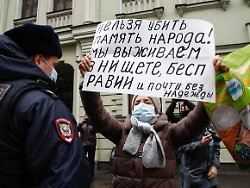Tuesday, December 14, 2021
Fight for Russian NGO
Putin’s memorial process provokes protest
The Russian Supreme Court is negotiating the dissolution of the human rights organization Memorial. The NGO works for political prisoners. Russian President Putin is convinced that it protects terrorists and extremists.
Several dozen people protested in Berlin against the threatened dissolution of the Russian human rights organization Memorial. They marched in front of the Russian embassy in the capital on Monday evening and held up signs saying “Hands off Memorial” or “We are Memorial”. The Russian Supreme Court has been negotiating the dissolution of a central part of the human rights organization since early this morning.
Memorial Germany, the writers’ association PEN and Amnesty International had called for rallies nationwide, including in Munich, Leipzig or Dresden and Halle / Saale. They are very concerned about the human rights organization in Russia, the organizations said. A ban on the organization, founded in 1989 by Soviet dissidents, including Nobel Peace Prize winner Andrei Sakharov, would be a severe blow to the last remaining critics of Russian President Vladimir Putin.
Russian justice is laying obstacles in the way
Russia’s General Prosecutor’s Office is seeking to dissolve the more than 30-year-old organization that is critical of the Kremlin. The Russian judiciary accuses Memorial of repeated violations of the law on so-called “foreign agents”. The human rights organization has been run as such since 2016 because, according to the Russian leadership, it receives financial resources such as donations from abroad. This classification forces Memorial to disclose its sources of funding and to provide a reference to all publications.
The human rights activists complain about the classification as political persecution. You have been campaigning for political prisoners since the late 1980s, but also for coming to terms with Stalinist and National Socialist crimes in the Soviet Union. Their impending end had triggered international protests in recent weeks. Criticism also came from Germany, for example from Federal President Frank-Walter Steinmeier.
Regardless of the ongoing proceedings, Russian President Putin recently publicly criticized the work of the institution. He claimed, for example, that the organization campaigns for terrorists and extremists.
“Done with you very quickly”
A board member of the human rights organization warned against the dissolution of Memorial. A ban would have a negative “signal effect” and would be “extremely deterrent,” said Vera Ammer on the radio station Bayern 2. Such a judgment would signal smaller initiatives in Russia: “We’ll be done with you very quickly if we don’t shy away from Memorial ourselves. “
“Memorial is known worldwide and these smaller initiatives, all of which still exist somewhere, are of course much less so,” said Ammer. “And when you break up with them, nobody notices.”
In the event of Memorial’s dissolution, Ammer demanded sharp reactions from the federal government and at international level: “I expect that the case will always be raised on all occasions and not be forgotten.” The case must be brought up “at the highest level in negotiations in six months, in a year and later,” said Ammer. “So that it is clear that this will not be forgotten and that will not remain without consequences.”
